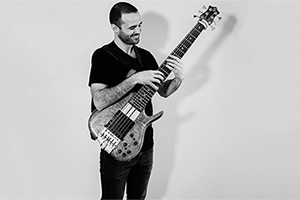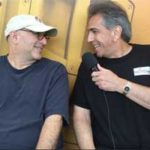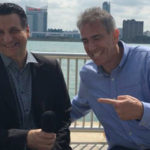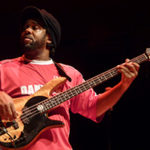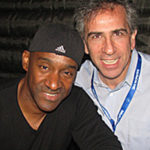6-string bass soloist transforms “mathematical approach” into award-winning arranging abilities
Exclusive interview with FBPO’s Jon Liebman
June 8, 2020
Photo by Olivia Ann
Josh Cohen is best known for his stellar compositions and arrangements on the six-string bass. Originally from Toronto, Josh has conducted numerous clinics and master classes throughout North America, and has the distinction of being named 1st place winner of the Phil Jones Bass/La Bella Strings “Solo Bass Competition” at the 2020 NAMM show. Josh’s debut album, Out of the Bassment, was released in 2014. The follow-up, Freedom, will be available August 21, 2020. Josh currently makes his home in Madison, WI.
FBPO: I understand your dad was the main reason you took up the bass.
JC: Pretty much. My dad had always played guitar when I was a kid. I’d even see him perform at some smoky clubs, back when you were allowed to smoke in these blues bars. I actually remember the smell of the tube amp!
FBPO: Yep! I know what you mean.
JC: My parents got a divorce when I was about 8 or 9 years old, and my dad got me into the Beatles, and gave me seven or eight of his Beatles CDs. I learned most of the lyrics, I learned all the melodies, and I was just singing them.
FBPO: How did you end up with a bass?
JC: My brother took up the guitar, and my dad gave him his Ovation acoustic. We were visiting my dad in Florida, and he said, “Josh, do you want to learn guitar?” I was 12 years old, almost 13. My dad had an Ibanez electric guitar and I was messing around with that for about three or four days. I kept losing the pick, so I started using my two fingers, like a bass player, but I didn’t know what a bass was. My dad saw this and he was like, “Hmm. Maybe it’d be better if you played the bass.” And I’m like, “What’s a bass?” He brings me into his bedroom, he reaches into this case that’s underneath his bed, and he pulls out this 1983 Precision bass that was converted, at some point before he bought it, to a fretless. And he was like, “Josh, this cost me $900, so if you don’t know how to play some things on it and know where all the notes are by the next time you visit, which was about 6 months later, I’m going to take it back. And I did!
FBPO: It’s great that you got that kind of encouragement. How did you tackle that task?
JC: My stepfather signed me up for some lessons back in Cincinnati, (where) I was living. I remember my first lesson, I learned the C major scale and I went home and I started figuring out that you could play the same notes, starting at different places, and I sort of figured out how to do that all up the neck. I guess I was very mathematically oriented in some sort of way, and I just loved patterns. I loved finding patterns. And I came back the next week and (my teacher said), “Oh, those are the modes.” Then I learned the names of the modes. I wasn’t even learning music at the time. I was just obsessed with the patterns.
FBPO: Your first introduction to the electric bass was on fretless?
JC: Yeah, it all happened on the fretless.
FBPO: Wow!
JC: There were lines on it, so that was definitely helpful, and I don’t think I was too perturbed by any issues with tuning. I made sure they sounded like the notes I was trying to play, but I don’t think I was so sensitive at the time. Now, if I pick up a fretless, I’m just like, “Oh, man!” If you really want to play fretless, you got to invest a lot of time into honing in on your intonation skills.
FBPO: What kind of music were you into at that point:
JC: I remember I liked Metallica. I had moved on from the Beatles to Metallica! [Laughs] My uncle had shown me like a boogie-woogie sort of bass line. I remember I sang a Metallica song in a “show and tell” class, and then I played a boogie-woogie bass line. Somehow, I thought awesome plus awesome must equal awesome, but clearly that’s not true. They’ve got to work together. [Laughs]
FBPO: Did you have any bass heroes or bass influences at the point?
JC: Yeah, I think Flea was pretty early on. And I started learning a little bit of slap. I remember I’d break so many strings from it, because I thought I could just slap the hell out of the thing, and I wasn’t really changing strings regularly. I would learn parts of songs, then I would sort of go off and create my own mathematically-oriented kinds of compositions that used the modes and patterns and whatever. I didn’t really get a feel for harmony.
FBPO: Obviously, you did eventually. How did that come about?
JC: I guess I was about 15 or 16, doing some music in school, and I remember a friend showed me a chord progression. It was like ii-V-I-vi, or something like that. It was in A major, so it started on B minor, and I was like, “Whoa! I didn’t know you could do that!” All I had done before was like, “This is the key, these are all the ‘good’ notes,” and I’d learn them all over the neck. I’d jam with friends, but we would just jam on one or two chords, and I’d just be thinking about the mode we were in.
FBPO: It sounds like your high school years were significant in your musical development.
JC: I went to high school in Toronto. I remember my first day in the music class at Rosedale Heights (School of the Arts) big band and we had to play “Respect.” And here I am, I thought I knew all my scales and modes, but I didn’t know how to read that well, and I just could not read that bass line. The drummer came up to me after class, and he said, “Hey, Josh, do you mind learning “Respect” because it’s a really good tune?” And I was like, “Uh, yes, definitely.” At that point, just the sheer embarrassment was such a driving force to get my reading chops together, so I would study those big band charts and make sure I was ready to go. There were a lot of walking bass lines written. I didn’t know how they were constructed at the time, but I would learn them. And I would sing them. I was always making sure I could sing the pitches. That just seemed important to me. There’s only so much sight reading you can do in a room by yourself. I think reading is one of those things that, when you’re put on the spot and you need to play with other musicians, that’s what really takes someone’s reading to that next level.
FBPO: You’ve become known for your ability to play unaccompanied solo bass. What attracted you to that style?
JC: Well, a few things. One, I’d seen it done. Victor Wooten is one of my heroes. His arrangement of “Overjoyed” definitely uses tapping technique and it is definitely in a polyphonic style. On A Show of Hands, he’s got a jazz medley where he’s doing walking bass lines with chords and things like that. And then also Michael Manring. I think it was Bass Day ’98, where he played a version of “Sugar,” by Stanley Turrentine. On a lot of Michael’s stuff, he uses different extended techniques, and he uses tapping, but this was actually one where it was sort of in a layered polyphonic texture of different parts, and I got driven to that. I’d taken some piano lessons when I was 16, and there was something about the puzzle of putting things together, once again that mathematical side of my brain, where I guess I was more enamored with putting parts together and having control over them, in real time, that had an attraction to me. So seeing it done sort of got me going. Then, when I was 23, I’d seen an arrangement of “Kiss From A Rose” by Seal. At the same point, I was learning Victor Wooten’s arrangement of “Overjoyed.” I was simultaneously going back between those two, and I was sort of using the concepts, the way of arranging for the electric bass as a solo instrument, to come up with that arrangement, and when it clicked I discovered something. It’s not driven by the techniques, which I guess could be seen as fancy, flashy techniques. It’s driven by, hey, how do I create music that, to the average listener, is gonna sound like a full performance, the way it would sound on a piano, but in a unique bass way? Once I knew it was possible and that it was a challenge, I became obsessed with it. Then I came through some of my mentors and teachers, and I discovered that there’s a sense of freedom, your ears opening up and ability to improvise with multiple parts.
FBPO: Is that what inspired the title to your new record?
JC: Yes!
FBPO: Tell me about Freedom. I’ve been listening to it. I love it!
JC: Oh, thank you, Jon. That means a lot. Really it does. You can never be 100% happy. There are a lot of things that I feel I missed the mark on, but I feel it does honestly capture what I was trying to express. A lot of albums might have cohesion from a thematic standpoint, lyrically or musically, but this is an album that is not drawn together from that perspective. It’s drawn together from an aspiration I had to achieve musical freedom at the polyphonic level. I’ve been very inspired seeing performances of Oscar Peterson and Herbie Hancock and Stanley Jordan. Seeing that they developed this ability to play in a multi-textured polyphonic way, but free, truly free, for a lot of times just for moments, just these moments here and there. And so what I envisioned for the album was to encapsulate this learned skill. I wanted it to be this exemplary record.
FBPO: How did you go about organizing the record and putting it together?
JC: I composed all the compositions at the end of 2017 and the beginning of 2018. Then I started studying with Gary Dial, who comes from the lineage of Charlie Banacos. Great teacher! And my initial feeling was (that) this structure is going to lead me to this point where I’ll be able to play these compositions in the way that you’d approach a jazz standard, even though some of them are funk and some of them are jazz, and have this freedom to accompany myself and explore. I would say I achieved the ability to, at times, do that, but not to a satisfactory level, or to a level where I felt free. I realized I needed to get this thing recorded, even if it’s just a snapshot of this moment. At that point I decided, for the album, I’m going to compose my improvisations. There is a transcription book. It will be published on, along with my album.
FBPO: Your self-publishing?
JC: I am self-publishing. There is a difference when somebody publishes a transcription book of some of these great legends that we all know, Marcus Miller and Victor Wooten, and these different players. I think it might lend itself very well to a larger publisher, but for me, self-publishing makes sense. The niche of my audience and the people that are going to be willing and wanting to learn some of the material on the album, even if just for the purpose of studying and learning a few sections here and there so they can co-opt it for their own musical explorations, I think those people are going to find me.
FBPO: And I’ll do what I can to help them find you!
JC: I appreciate that! I was reading some of your recent interviews and I was just amazed at how prolific you have been over the years. It’s a service to students to have access to all these educational materials that you’ve published and the interviews and the things that you’ve put on your blog. I’m glad we have that. These are the things that are enriching the bass community, and also the wider musician community, in a very meaningful way.
FBPO: What advice can you impart to someone who wants to learn bass?
JC: Nothing will replace the real-world experience of playing with other musicians. I think that is 50% of your learning. Invest in your education, get a good teacher, but you need to have an outlet. If you really want to improve your playing, there needs to be a performance outlet for what you’re learning. Always do your homework. Get into the weeds. The performance stage is where our intuition takes over, and our sub-conscious takes over. The things that are at the forefront of our consciousness at that point are, what’s the vibe of the room, what’s the vibe of the band, what’s our conversation about, the broader topics. We all have to realize that what we’re working on in the practice room takes time to cultivate and become part of the sub-conscious. If you feel that a lot of your practice is very cerebral and very methodical, don’t worry. The natural stuff will come. What you’re practicing now might be natural a year or two from now.
FBPO: Tell me about your gear.
JC: I use a Ken Smith bass about 99% of the time. It’s got a very thin profile, and the body is kind of large. I’ve discovered that’s something that I really like. It plays just beautifully! It stays in tune really, really well, better than the many other basses that I’ve used. With the polyphonic stuff, a lot of times I’ll often have at least five strings playing simultaneously, in multiple registers. At that point, having really solid intonation becomes important. I also use Phil Jones amps, Gruv Gear products, and La Bella strings.
FBPO: What about the future? What else would you like to do that you haven’t already accomplished?
JC: Well, with this whole COVID-19 situation, a lot of us musicians are seeing our potential tours not look like they’re happening. I have a tour planned in California in November and there’s a chance that won’t happen. I have to see where things go. The more that we’re staying home, I think we’re going to explore the online realm. What I want to start investing more in is publishing books. I was thinking of doing a tapping book that’s for 4, 5, and 6 strings, and I have some ideas about that. In terms of on the horizon musically, I think (for) my next album, I want to do one that’s just drums and bass, so (I’m) thinking about where to go with that. I’m probably leaning to funk/dance bass music, and I don’t know if I’m going to go the original route or do arrangements. It’s fortunate to have the time to invest in these creative endeavors and explore music. Just that you can take half an hour and study your minor seven flat five chord and get into that world, that’s a privilege because there are people (for whom) that’s not an option and they don’t have access to music education. Another thing is thinking about how to give back, and I think teaching is one of those ways, seeing if there’s opportunity to teach those that can’t afford lessons. There are definitely volunteer opportunities. That’s something I want to look more into as well.
FBPO: What would you be if you weren’t a bass player?
JC: I’d probably be going into science. I wouldn’t go into one of those careers where you just make a lot of money, unfortunately! [Laughs] I’d probably go into paleoanthropology or astronomy or astrophysics. I’ve never been good at algebra, so there are some prerequisites missing, but those are interests that I’ve always had. I loved reading about evolution, human evolution and evolution of other species. I could totally see being able to study something like that would be amazing and a privilege once again, the fact that humans are the first species that can study themselves and the universe. I think that would be a really amazing exploration.
See Jon’s blog, with key takeaways from this interview, here.
Out of the Bassment is available here:
